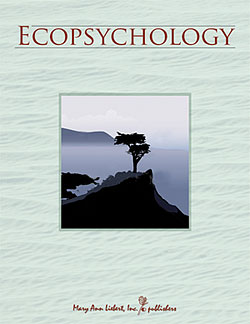[fusion_builder_container hundred_percent=”yes” overflow=”visible”][fusion_builder_row][fusion_builder_column type=”1_1″ background_position=”left top” background_color=”” border_size=”” border_color=”” border_style=”solid” spacing=”yes” background_image=”” background_repeat=”no-repeat” padding=”” margin_top=”0px” margin_bottom=”0px” class=”” id=”” animation_type=”” animation_speed=”0.3″ animation_direction=”left” hide_on_mobile=”no” center_content=”no” min_height=”none”]
The Personal and Planetary
Ecopsychology holds the promise that the promotion of human potential and healthy ecosystems can coexist and pairs self-discovery with ecological responsibility. In fact, a synergy is seen between personal and planetary health: development at a scale that promotes human health, promotes the health of the natural environment and our kindred species (Roszak, 1978). As I attest with my recent call for”second generation ecopsychology” (Doherty, 2009), the person/planet connection is not simply an abstraction, romantic ideal, or countercultural concern. It is a reality, worldwide. There is a consensus on humanity’s physical connection to the biosphere, whether through restorative effects (Kahn, 2001) or health threats such as those posed by endocrinedisrupting chemicals (Diamanti-Kandarakis et al., 2009) or global climate change exposures (IPPC, 2007). There is growing acceptance of psychological impacts of global environmental issues whether through the stress of continuous exposure to representations of global issues in electronic media (Stokols, Misra, Runnerstrom, & Hipp, 2009) or the loss of security and well-being associated with a disrupted sense of place (Connor, Albrecht, Higginbotham, Freeman, & Smith, 2004). The ideal of an ecologically intelligent scale underlies the global movement toward sustainability.
READ THE FULL article:
![]() June 2009 • “Leading Ecopsychology” in Ecopsychology: 53-56[/fusion_builder_column][/fusion_builder_row][/fusion_builder_container]
June 2009 • “Leading Ecopsychology” in Ecopsychology: 53-56[/fusion_builder_column][/fusion_builder_row][/fusion_builder_container]
